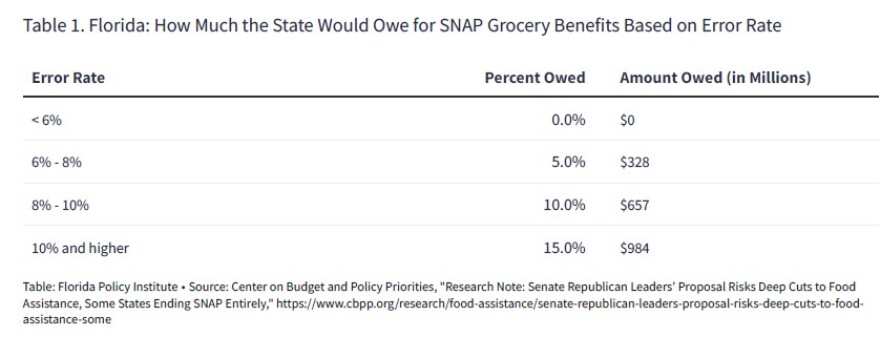As early as 2027, states will have to cover a chunk of the food benefits that more than 2.8 million Floridians rely on.
The change is part of H.R. 1, or the Big, Beautiful Bill Act, approved by federal lawmakers earlier this year.
This structural change marks the first time states will be forced to contribute to the cost of benefits themselves. As outlined in H.R. 1, the amount owed to the federal government will be decided by the state’s error rate.
Error rates
Errors are mistakes made while administering the grocery benefits to low-income families. They’re typically underpayments or overpayments of grocery benefits and are later adjusted by the state agencies.
Earlier this month, Florida lawmakers learned that the state's error rate was 15.4% in 2024. Using the sliding scale approved in H.R. 1, states with an error rate of 10% or higher will owe the federal government 15% of SNAP costs starting next October.
That would cost Florida nearly $1 billion using the state’s current error rate.

Lawmakers discussed the shortfall at a House Human Services Subcommittee meeting following a presentation by Bridget Royster, with Florida’s Department of Children and Families, about the federal changes coming to SNAP.
“Being that we’re going to lose a significant amount of funding … what is the state’s plan to deal with that?” House Rep. Rita Harris (D-Orlando) asked during the October meeting.
State leaders didn’t have an answer yet, except to work on reducing the SNAP error rate.
ALSO READ: Floridians on SNAP and WIC worry about benefits during government shutdown
Royster said the state’s error rate has increased in recent years following the COVID-19 pandemic and consecutive major hurricanes, the latter of which correlates with an uptick in temporary disaster SNAP applications.
She also criticized the mechanism that the federal government is using to calculate error rates, claiming it’s delayed and unfairly inflates error counts.
“When a payment error is identified, it's based on a new eligibility determination, not … a review of the decision that was made by the department,” Royster said.
When the federal government reviews a state agency’s payment calculations, it treats the sample size of beneficiaries like new applicants. Therefore, if there’s been a change in income, or other self-reported data, in the months since the state agency made the determination, it will result in an error, Royster said.

Florida’s response to SNAP changes
Beyond working to reduce error rates, the state’s response to changes coming to SNAP is still to be seen.
Food policy experts have raised alarms that Florida lawmakers may opt to shrink, or even eliminate, the program.
“It’s even more pivotal now, at a time where people are struggling, [that] the state really takes an approach in terms of access while focusing on reducing errors, which really means that making sure that the state has the capacity…to help with administrative issues,” SNAP deputy director of the Food Policy and Action Center Gina Plata-Nino said.

While lawmakers have not publicly discussed how to cover the shortfall in SNAP benefit costs, Senate President Ben Albritton told WUSF that state lawmakers intend to continue administering the program in the state.
“SNAP benefits are absolutely important … and I would argue … there is not a single topic that motivates Floridians more than the idea of feeding hungry children,” Albritton said.
Gabriella Paul covers the stories of people living paycheck to paycheck in the greater Tampa Bay region for WUSF. Here’s how you can share your story with her.





